Month 9:14, Week 2:6 (Sheshi/Kippur), Year:Day 5949:249 AM
2Exodus 6/40
Gregorian Calendar: Sunday 10 November 2019
New Testament Studies
The Complete Messianic Evangelical
New Testament Phronema Study Series
9. Levi's Toll (Mark 2:13-17)
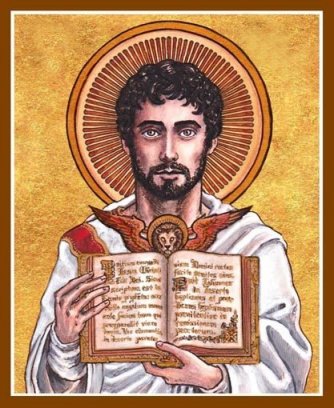
Continued from Part 8 (Mark 2:1-12)
Introduction
Welcome to the 9th part of this New Testament Phronemic Study Series. I hope you are enjoying this as much as I am preparing and teaching it. I have to say it has been quite an ongoing adventure and learning experience for me personally.
My Personal Experience in Preparing This Material
I decided last week that I needed to cover more material and had planned to merge two of the five 'conroversy' stories of chapters 2 & 3 together today (we covered the first one last week), but realised quite early on when I started preparing for today that to do so would mean jumping over important material as well as compromising the phronema or 'overall spirit' of the events that took place. I never dreamed it would be possible to get so deeply into it and that's in part why I have been so enthralled, humbled and - at times - plain overwhelmed.
Isho'dad of Merv
I have become more and more conscious, as I have studied the commentaries on the Gospel of Mark, that every generation 'reads in' it's own ideas shared by the progress and development of theology throughout the long march of history. One of the most interesting commentaries, from the 9th century, has been that of the Assyrian Bishop of Hadatha (in modern-day Iraq), Isho'dad of Merv (or Maru), written around 850 AD. It has been interesting to see how some of the original phronema of the first century Messianic Community (Church) has been retained and how much been lost and changed, remembering that 800 years have passed. That's a long time. And yet there are memories, still vivid then, that have been lost in the 1,000+ years that have passed since Isho'dad wrote.
The School of Antioch
Why have I chosen Isho'dad? Because he is regarded as the founder of the Assyrian Christian Community, the father of the Eastern Church, some of whose members I have come to meet and get to know because they have formed a part of the exodus from the current Iraqi and Syrian wars and are refugees here. Isho'dad was of the Antiochan School that focussed on historical and philosophical problems of the scriptural texts and rejected the allegorical approach and interpretation that is preferred by the Western Church.
Was Mark One of the Seventy?
For instance, we have always known the Matthew and John were of the original 12 apostles, but what seems to have been lost since the days of Isho'dad is the fact that John Mark and Luke [1] were of the original Seventy talmidim (disciples) sent out by Yah'shua (Jesus) ahead of Himself rather like 'John the Baptists':
"...the Master appointed seventy others also, and sent them two by two before His face into every city and place where He Himself was about to go" (Lk.10:1, NKJV - also see v.17).
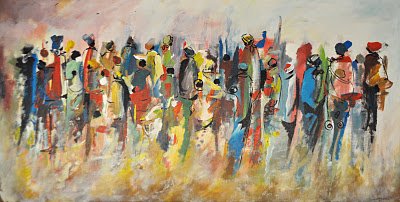 Were Mark and Luke 2 of the 70 trainee disciples sent out by Christ?
Were Mark and Luke 2 of the 70 trainee disciples sent out by Christ?
Mark as Peter's Own Son?
Now if that's true, that would explain how Mark and Luke qualified to be Gospel writers and it means that in fact Mark was a convert a lot earlier than we have thus far presumed. Not only that, but according to Isho'dad, John Mark was the literal son of the Apostle Peter [2] which he, Isho'dad, learned from Clement of Alexandria (and remember I suggested to you early on that Mark was, in fact, the founder of the Assembly (Church) at Alexandria in Egypt). So it's worth making a mental note of these tidbits of information and seeing if they accord with the overall tenor of what we read in the Gospel of Mark. This would explain, if true, why Mark's own biological father and apostle related his life story to his son in such intimate detail - Peter to John Mark -it makes a lot of sense to me. I try to do the same with my own children so they know what their Dad really believed from what they have heard me say day in and day out as they grew up and not what others have concluded from merely reading what I have written in a few essays here and there.
The Apostles Were Family Men
This information also reinforces what we've always known, namely, that Roman Catholics started reinventing history and doctrine to fit with their evolving teachings about marriage and celibacy because it's clear all the apostles were married and had families, and that many of their children became closely involved in the work of the Kingdom. It's what you would naturally expect.
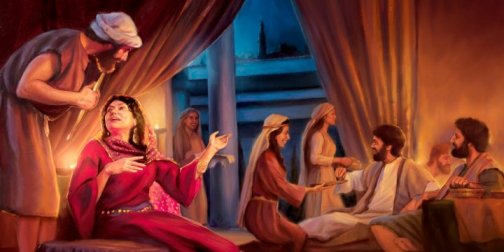 The apostles not only took their wives with them but evidently children too
The apostles not only took their wives with them but evidently children too
The Importance of History
It's these extra personal touches that can make the Gospels all the more interesting and come more alive, a reason why doing history is important. Unless you're an historian, like N.T.Wright, you tend to lose track of the setting and with it, that spiritual essence or phronema. Modern commentaries have, alas, been hugely shaped by secular Enlightenment philosophy, more than most care to admit. The lenses through which we 'read' the Gospels affect our perception of things which is why in this course I am giving much attention to historical detail. Fleshing the scriptures out makes them more personal and interesting to us. Unfortunately, a lot of apocryphal stories emeged in the immediate centuries following the first hundred years so we do have to do our history rigourously and scientifically to make sure the evidence is sound. By the mid 9th century - and we're talking 800 years after the events described - when Isho'dad wrote his commentaries, there were all sorts of commentaries in existence, and not all of them historically reliable.
Mark 2:13-17
Let's go into our main text for today which is chapter 2, verses 13-17. This we call the 'Second Controversy (or Conflict) Account'. For those of you joining us for the first time, we shall be reading from N.T.Wright's Kingdom New Testament (KNT) translation to get the overall sense and then we'll dissect today's passage for a more detailed analysis in the New King James Version (NKJV):
"Once more Yah'shua (Jesus) went out beside the sea. All the crowd came to Him, and He taught them. As He went along He saw Levi, son of Alphaeus, sitting at the toll booth. 'Follow me!' He said. And he got up and followed Him.
"That's how Yah'shua (Jesus) came to be sitting at home with lots of tax-collectors and sinners. There they were, plenty of them, sitting with Yah'shua (Jesus) and His talmidim (disciples); they had become His followers. When the legal experts and Pharisees saw Him eating with tax-collectors and sinners, they said to His talmidim (disciples), 'Why does He eat [and drink] with tax-collectors and sinners?' When Yah'shua (Jesus) heard it, He said to them, 'It's sick people who need a doctor, not healthy ones. I came to call the bad people, not the good ones'" (Mk.2:13-17, KNT; cp. Mt.9:2.8; Lk.5:18-26).
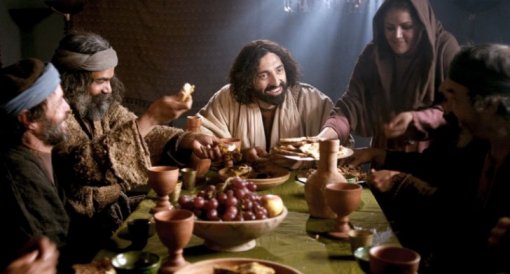 Yah'shua eating with tax-collectors and other sinners
Yah'shua eating with tax-collectors and other sinners
The Fourth Apostle is Called
This section consists of two short narratives that have been combined by John Mark because both are concerned with the same subject, namely, the Master's friendly relations with moral and religious outcasts. I am sure you will already have noticed that this first section (vv.13-14) has the same stark features as the story in Mark 1:16-20 when Yah'shua (Jesus) called Simon Peter, Andrew, James and John. This time it is the turn of a man called Levi. On this occasion, there is no evidence that Levi has had any previous contact with Yah'shua (Jesus) as the first four had, as we know from the other Gospels, which makes this calling all the more remarkable. These are the only apostolic callings Mark records, five out of the twelve. You'll see why Levi's calling is remarkable in a moment. We can assume that some time has passed between the two segments of the text, verses 13-14, and verses 15-17. Let's take a look at those two verses again this time in the NKJV (Evidence Bible/EB, p.1390):
"Then He (Yah'shua/Jesus) went out again by the sea; and all the multitude came to Him, and He taught them. As He passed by, He saw Levi the son of Alphaeus sitting at the tax office. And He said to him, "Follow Me." So he arose and followed Him" (Mark 2:13-14, NKJV)
The Nature of Levi's Call
This time we don't know what Levi's motives were for accepting and responding immediately to the call though I think we can make some intelligent guesses. Everything hinges on the One who calls and the decisiveness and finality of the call. The circumstances are radically different from those of the first four fishermen. Levi was an official in the service of the Tetrarch of Galillee, Herod Antipas.
A Larger Territory Subdivided Between Three Sons
When Antipas' father, Herod the Great, had died in 4 BC, his large kingdom had been divided between three of his sons: Archelaus got Judea in the south, Antipas got Galilee in the north with some territory in the Jordan valley too, and the third son, Philip, got the territory which today we call the Golan heights and all the way into Syria. The border between Antipas' territory and Philip's was the river Jordan as it ran south from Mount Hermon into the Sea of Galilee. The last town you would go through travelling east from Antipas' territory and Philip's, or conversely, the first town you would come to going west into Galilee, was Capernaum (K'far Nachum). That's why Capernaum was such an important provincial outpost.
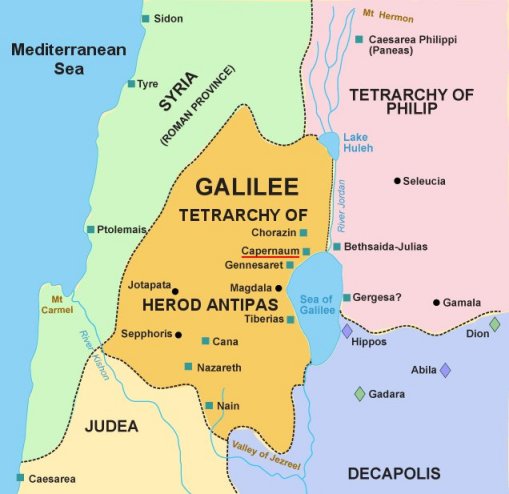 Capernaum was a frontier polling station between two minor Kingdoms
Capernaum was a frontier polling station between two minor Kingdoms
Toll Booth, Tax Office or Customs Post?
Today, as then, when you cross a border (or use airports, bridges, or certain motorways) you often have to pay a toll, which is why Levi was sitting at a "toll booth" in the KNT, probably at a table and chair either outside a small building or inside at an open window by the road on the edge of town. The NKJV calls it a "tax office" (also the NASB) - other versions call it "the office in which he collected the custom duties" (Barclay), "at the receipt of custom" (KJV - as though it were a customs post), "custom house" (HRV, NEB). "the place of toll" (ASV), "tax collector's booth" (NIV), "tax booth" (NIV, ESV), "tax collection booth" (NLT), and so on.
Why Tolls Exist
Here N.T.Wright is the most accurate - this was the place where a fixed fee was charged (not a place where goods were taxed) and for the 'privilege' of simply entering or leaving the territory. My point is this: before the partition into three territories when Herod the Great was still alive these toll stations didn't exist. Before, crossing this border, it was free. But now every time you passed through Capernaum, in either direction (east or west), you had to cough up. This was an easy way for petty tyrants to swell their coffers so they took advantage of poor people in this way. These days governments install tolls in order to help pay the expensive bills for building a road or bridge, for example. They become such good sources of revenue, though, that often governments will leave the tolls in place even when the costs for the original project have been paid for. Sometimes, as in parts of England, public roads pass through private land and the land owner charges cars for the privilege of driving across his land.
How Modern Tolls Work
Now I don't know about you, but I used to find toll stations exceedingly irritating, especially if you were travelling on a small budget and have to go through lots of these, the more so if you made wrong turnings and had go through the toll booth multiple times! I've done this in Oslo more times than I can remember. It's also annoying if you have to interrupt your journey, when you're in a hurry, to throw coins into an electronic basket or pay an official sitting in a glass booth on the side of the motorway as we used to a decade or so ago. These days it's all automated - your licence plate is scanned and photographed by an automated camera and then you get sent a bill in the post and have to cough up what in Norway we call bompenger, unless you paya monthly subscription fee in which case you can go through the booths as often as you want.
A Job Full of Abuse
Can you picture in your mind how unpopular these toll collectors were? A bit like car-park attendants in the UK! So Levi would have had people grumbling, shouting and swearing at him every day, not the kind of career you'd proudly admit to if asked at a party, 'So, what do you do for a living?'. Maybe it was the only job Levi could find. One thing we can be sure of, though, is that the ordinary Yehudi (Judahites) resented these toll-collectors. They hated them. And then Yah'shua (Jesus) comes along and treats Levi as a human being, possibly for the first time in his career. What a refreshing sound to his ears, what a joy for his heart, having heard only anger and resentment day in and day out all his working life in that job. I imagine most tax collectors and toll booth officers simply closed their hearts down after a while and became cynical, sarcastic and contemptuous toward their verbal assailants. Might you, perhaps, have responded in the same way, by quitting there and then if you were suddenly treated differently, and offered a job in which you would be appreciated? Mind you, it was a lucrative job and tax collectors often dishonestly overcharged.
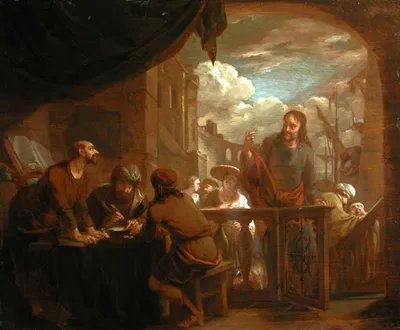 Levi at his toll booth is called by Yah'shua
Levi at his toll booth is called by Yah'shua
Two 'Kings of the Jews'
Don't miss the prophetic side of this either because it sets up a sharp contrast between the flesh and the spirit. You see, Herod Antipas would have been known as the 'King of the Yehudi (Judahites)' ('King of the Jews' in our traditional English translations) and here Levi was being called by a new Master, the true 'King of the Yehudi (Judahites)' though this claim was as yet deliberately unspoken and therefore unknown, for the same reason the Master didn't want demons telling people He was the Messiah. It would have preciptated a political reaction before the right time for His arrest and crucifixion. So that is one reason why, I suspect, the Ruach (Spirit) wanted John Mark to specifically record this incident. This is not a title Yah'shua (Jesus) has claimed, nor does He ever announce it Himself, but rather confirms what later the Roman Procurator, Pontius Pilate, asks: "Are you the king of the Yehudi (Judahites, 'Jews')?" (Mark 15:2, NIV). But, as I said, we're not supposed to know that yet. But the reader or listener is being prepared to hear this through prophetic hints and suggestions in the unfolding story. This is, in any case, too meaty for the talmidim (disciples) to hear and understand just now. They have enough to take in as it is! Not until we get to Mark 8:29, when the talmidim (disciples) have spiritually matured a bit, will the first of the apostles, Peter, finally declare with his own lips who Yah'shua (Jesus) really is - the Messiah, Son of the living Elohim (God), and King of the Yehudim (Judahites).
Different Sacrifices Made
Anyway, Levi the toll-collector (or customs official if you prefer, or "publican" as the KJV incorrectly calls him [3]), without hesitation, accepts the offer of a new career, which, on the one hand, would have been a much simpler and easier thing for him to do than leaving a family fishing business behind as James and the others had done earlier. On the other hand, his renunciation of a lucrative calling was greater than that of the fishermen, since it was final (he'd never be hired again by his erstwhile (previous) master for deserting his post), whereas the fishermen could, on occasion (as they subsequently did) return to their fishing. His call illustrates the grace - the undeserved loving-kindness - of the Master in choosing a despised toll-collector to be an apostle, but also the wisdom of Yahweh, because Levi almost certainly was multi-lingual, knowing both Aramaic and Greek (and possibly Latin too) and so would be useful in reaching the polyglot (multilingual) communities that formed this part of the world.
All Convert Differently
The only thing that he took with him out of that profession was his pen and ink (assuming he even owned those) whereas the fishermen still had their boats, their nets, servants, extended family of helpers, and a lake full of fish both to eat and sell! Levi had literally given up everything, and there and then, on the very spot! The impression I get from this text is that this time it was an instant decision, unlike that of the previous four who obviously needed more time to make arrangements at home. I think it's important to make the point in recognition of this that people come to Christ in different ways and take shorter or longer periods of time to do so. There is no 'ideal' way to convert and there is no uniform 'sacrifice' that we must make to follow the Master. And had conversion been 'compulsive' in any way, as the Calvinists teach (by 'irresistable grace', so-called), then everyone would presumably come in more-or-less the same way (though to be fair to the Calvinistic position, the way Levi converted certainly appears to be by divine compulsion though we're not actually told the details of how he converted - at any rate, he had genuine free will to say 'no' if he had wanted to [4]).
Levi, Matthew, James and Alphaeus
So if Levi became the fifth apostle (in Mark's account, at any rate), why don't we hear him mentioned again? We will have to wait until the Gospel of Matthew to learn that Levi and Matthew are actually one and the same person (Mt.10:3), which shouldn't surprise us since it was not uncommon for the Saviour to give His followers new spiritual names in addition to their birth names to reflect their calling or spiritual nature in some way. People sometimes wonder if maybe this Levi (or Matthew), whose father's name we're told was "Alphaeus", was the brother of "James the Son of Alphaeus" in Matthew 10:3, which is possible, of course. But really there is no way of knowing as these two men may simply have had different fathers called Alphaeus. Then there are some Greek manuscripts (MSS) of the Gospel of Mark where the copyists have speculated that James and Levi were one and the same person (because of this paternal similarity), but that error is corrected by Matthew (who unequivocably wrote his Gospel in Hebrew, which is why it is ranked first of the four Gospels even if it probably wasn't the first chronologically).
The Tax-Collectors' Party
So now the scene is set for the second segment of this text we're studying which we'll take as a single block, so let's turn to verses 15-17 in the NKJV (EB, p.1390):
"Now it happened, as He was dining in Levi's house, that many tax collectors and sinners also sat together with Yah'shua (Jesus) and His talmidim (disciples); for there were many, and they followed Him. And when the Torah-reachers (scribes) and P'rushim (Pharisees) saw Him eating with the tax collectors and sinners, they said to His talmidim (disciples), 'How is it that He eats and drinks with tax collectors and sinners?' When Yah'shua (Jesus) heard it, He said to them, 'Those who are well have no need of a physician, but those who are sick. I did not come to call the righteous, but sinners, to make teshuvah (repentance)" (Mark 2:15-17, NKJV).
The Healer and Exorcist Who Loved Social Outcasts
Let's pause for a moment to consider how, by this time people were viewing Yah'shua (Jesus). They didn't obviously know He was the Messiah and they didn't know He was their rightful King either. N.T.Wright says they saw Him "as an odd combination [of] a doctor throwing a great party" [5] - a 'doctor' because He healed everyone who came to Him, but not just people with medical conditions, but those with demonic issues and, like Levi, people with social issues - those who had become social outcasts because of the jobs they did or the lifestyles they lived. Later on in this course we'll meet another class of 'untouchables', those trapped in prostitution.
Yah'shua was Not a Liberal Party-Goer or an Ultra-Conservative
So here's a second prophetic element in today's text and that is the astonishing picture of Yah'shua (Jesus) attending a party at a social outcast's house! That's not obviously to say that Yah'shua (Jesus) was some liberal Yehudi (Judahite) who was 'into' the first century Palestinian 'partying scene' frequented by sinners, as many try to portray Him. Rather, He was willing to go anywhere to save lost souls, where many self-righteous 'holy' people refuse to go for fear of being 'contaminated' - in reality, it's because they either don't care about such people or have given up on them as 'unsavable'. I have met many people who, for instance, think satanists are 'unsavable' (perhaps because they are Calvinists who think such were predestined to damnation even before they were born) and abandon them to their fate as not worth their time. And whilst it's true that a great many probably are not going to be saved, there are enough who definitely are savable to warrant witnessing to them as Yahweh leads (you will need concrete revelation how, when, and to whom). They may need a lot of ministry and require expertise to help them get out of their particular bondages but they most definitely are savable if they want to be. If not, then it's because they have already chosen to perish and suffer in hell.
Use Common Sense & Take Precautions in Witnessing
That does not mean that new or inexperienced converts should head off to a coven meeting or go to some orgy to witness to people by participating in their wickedness in order to 'befriend' them. You have to use your common sense and stick resolutely to the mitzvot (commandments). There are scriptures telling us to stay away from such places and company for the simple reason people have weaknesses and are susceptible to temptation, whether it be peer pressure, because they are ex-alcoholics, ex-sexaholics, or whatever it may be. That's not to say that the Enemy doesn't lay temptation before all believers, even the strongest and maturest, and especially in situations such as this, because he does and will continue to do so. That's a reason we are counselled to witness two-by-two if we are called to go into such dens of vice to seek lost souls. It's really common sense if you stop to think about it. But you do have to take some risks for the Kingdom. Levi didn't come looking for Yah'shua (Jesus), it was the other way round. Just be sure you are sensible and shun amateur (and potentially lethal) heroics.
The Party as a Prophetic Shadow
So what's the prophetic element here in the Master attending a tax-collectors' party? Why has the Ruach (Spirit) led Mark to include this story? One reason is because the Saviour's vision of the Kingdom of Elohim (God), just like that of the nevi'im (prophets) before Him, was of a great Feast to which everyone was invited. Not that everyone came (they had their free will), but certainly everyone was invited, and that's our calling, to invite those Yahweh places in our path. Messianics perhaps understand this better than most Evangelicals because we obediently celebrate a number of divinely appointed moedim of feasts throughout the year foremost amongst - of which this tax-collectors' party is a hint or a signpost - is the Feast of Tabernacles or Sukkot or the "marriage supper (feast) of the Lamb" (Rev.19:9)...though we don't obviously know about that yet in the current story line. That understanding is for a maturer body of believers several years later.
Sinning to Witness is Not Justified
Again, let me underline, the example Yah'shua (Jesus) sets here is not a licence for us to be promiscuous or lawless in any way. It doesn't mean we should go to a party to imbibe alcohol (since New Covenant believers are Rechabites), sexually cavort with those who we are not lawfully married to (according to strict Torah rules), break kashrut rules by eating bacon or ham sandwiches - witnessing among social outcasts is not the green light to sin in order to gain their trust - ever. But one thing you don't need to fear any more is 'ritual uncleanness'.
Two Disasterous Examples
A good friend of mine, whom I highly respected as a gospel teacher, and a fellow covenanted Rechabite, once went and shared a beer with someone he was trying to witness to, and I had to call him out on that as he had broken his covenant. He thought it would break down social barriers. Well, not only did his friend not convert but he lost respect in his friend's eyes, understandably so. It was totally unnecessary and fruitless. Satan gets us in all sorts of subtle ways if we're not careful. The same sort of twisted logic, though much worse, was used by a female Lutheran priest in Denmark a few years ago who went to bed with one of her parishioners in order, as she claimed, to 'comfort' him. In so doing she became a fornicator and adulterer, and since she thought there was nothing wrong in what she did and did not repent, by her wicked behaviour and terrible example she excluded herself from the very Kingdom she was commissioned to witness of! (1 Cor.6:9) So don't be a fool. We'll discuss this further when we come to Paul's teachings about inclusiveness which are likewise twisted by liberals to justify sinning.
Society's Outcasts at Table
So here we are, in Levi's house, as confirmed by Luke (Lk.5:29), which was, by the sounds of it, quite spacious given he was entertaining a large number of guests. The meal table, as you know, is regarded in the Middle East - and should so be regarded by all believers in every culture - as the place of most intimate fellowship (outside the marriage relationship, of course) [6]. This, then, was the next ground of offence for the Torah-teachers (scribes) and P'rushim (Pharisees) because Yah'shua (Jesus) and His talmidim (disciples) dared to hold close association at the meal table with moral and social reprobates. According to what we know about this period of time, even the pagans coupled tax officials alongside "adulteres and pander[er]s (people who cater for vulgar sexual desires), flatterers and sycophants" [7]. But in the eyes of the Yehudim (Judahites) of the time, these people had the additional faults of serving heathen masters (like the Romans) and mixing with 'unclean' Gentiles of all sorts. So it was impossible for tax and toll officials to keep the Torah in the manner required by the P'rushim (Pharisees). They were essentially 'damned' whatever they did.
The Two Big Fears of the Scribes and Pharisees
This episode in the Gospel of Mark is called the 'second confrontation' or 'conflict' because in doing what He did, Yah'shua (Jesus) committed a taboo - a big 'no-no' - rather as David had done in eating the temple shewbread while on the run from Saul. Why did the Torah-teachers (scribes) react the way they did? Well, there were essentially two reasons:
- 1. To have eaten in the home of one of these tax-collectors might have entailed consuming food on which tithes had not been paid or which had been improperly killed, prepared, or served. It wasn't just breaking Torah that concerned them but the "tradition of the elders" too though Yah'shua (Jesus) doesn't specifically call them out on the latter until a bit further on in the story (Mk.7:3,5; cp. Mt.15:2). Partying with these people would have involved, in their own minds, being defiled through contact with garments, dishes, or furniture regarded as unclean, the same as in modern Orthodox and Ultra-Orthodox Judaism; and
- 2. They were scared that association with such people might lead to them lapsing into their way of life. Though they didn't know it, their fear was flesh-based - at least that concerning the "tradition of the elders" - because it was not backed up by the Ruach haQodesh (Holy Spirit).
A Big Deal for the Scribes
It is easy for us, with hindsight, to criticise this behaviour over what most of us would consider morally insignificant details. But for those present, this was a big deal, much as turning on electric lights on the sabbath is to Ultra-Orthodox Jews today. If you had challenged these folks on their attitude, you would have been firmly reminded by them of those scriptures in the Tanakh (Old Testament) which state that:
- 1. Yahweh demands unconditional obedience to His mitzvot (commandments); and
- 2. Those mitzvot (commandments) included things like tithing, ritual cleanliness, and all the rest, reminding me of serious Moslems who are terrified to be defiled by touching dogs.
What the Scribes Were Probably Thinking
Bear in mind that the Gospel of Mark was written for a Greco-Roman readership so they would not have been concerned about the minutae of the Torah, but what about those Yehudim (Judahites) living in the diaspora - in Rome, for example? They would likely have retorted: 'Who are you to say that these mitzvot (commandments) are morally insignificant?' To have answered them, you would have had to know a few things about these Torah-teachers and P'rushim (Pharisees) from that period of time.
Reactions to Yah'shua's Actions
Actually, it's worth rembering that there were Pharisees who would have welcomed back repentant sinners, and they might even have taken steps to bring sinners to repentance, though they could would never have countenanced any contravention of Yahweh's expressly declared will. So how, they would have argued, could One (Yah'shua/Jesus) who claimed to be the very agent of Yahweh's will, keep company with "sinners", an activity that He must have known was constantly involving Him in the contravention of that will? These were the kinds of initial thought processes that the religious leaders would probably have entertained.
Passive vs. Active Pastoring and Evangelism
First of all, be aware of the fact that the P'rushim (Pharisees) in general had a real anxiety to make the return of the sinner easy, even though they were inclined to leave the initiative up to the sinner because they believed Elohim (God) always took the first step (not unlike the Calvinistic doctrine, actually). Yet here was Yah'shua (Jesus) doing the very opposite - He did not avoid sinners but actively sought them out! So the religious leaders were actually more passive in their attitude toward sinners. So they asked the talmidim (disciples), "How is it that He (Yah'shua/Jesus) eats and drinks with tax collectors and sinners?" (v.16, NKJV) Why, then, does Mark not deal with the discrepancy between the will of Yahweh for Yah'shua (Jesus) and His general mitzvah (commandment), expressed in the Tanakh (Old Testament), that the righteous were not permitted to consort with people who were liable to be a source of ritual impurity? Indeed, that is the kind of question a number of more modern liberal-leaning scholars tend to ask too.
Returning to an Earlier, Fuller Torah
We're not offered an explanation at this stage - the reader or listener is left to wrestle with the apparent contradiction. It's not until we come to chapter 10 that a similar 'contradiction' arises concerning the religious leaders' liberal attitude of 'easy divorce' (for the man) that we learn such regulations were added to a much earlier and more complete set of regulations "because of the hardness of [men's] heart[s]" (Mk.10:5, NKJV), introducing a whole new category of Torah, namely, that written especially for hard-hearted people. We will come across this concept as we get deeper into the Messianic Scriptures (New Testament) so it is important that we are alert not so much to supposed 'contradictions' with the Law of Moses but with the restoration of a fuller, more complete Torah that had to be tweeked because of the stubbornness of men's hearts because it was being misinterpreted and making moral conditions even worse.
What Kind of Moral Change?
Here we have to be very careful indeed because very few examples of such moral changes in the Torah are actually given. Secularised 'enlightenment' theologians like the Lutheran Adolf von Harnack have insisted that Yah'shua (Jesus) introduced new moral principles into human behaviour and in consequence regarded the Saviour's answer to the religious leaders as "one of the greatest landmarks" in the history of morality and religion. But be aware the implication is that there is some sort of uniform 'evolution' going on from something primitive to something more enlightened. And if by saying what Harnack did, namely, that this was not something 'brand new' then we have to look for evidence that what is in fact happening is a restoration of what was previously lost owing to the hardness of men's hearts. That is my view, and I cite Yah'shua's (Jesus) response to the lax divorce laws, when He explained, "but from the beginning of the creation" (Mk.10:6, NKJV) things were different - a lot stricter.
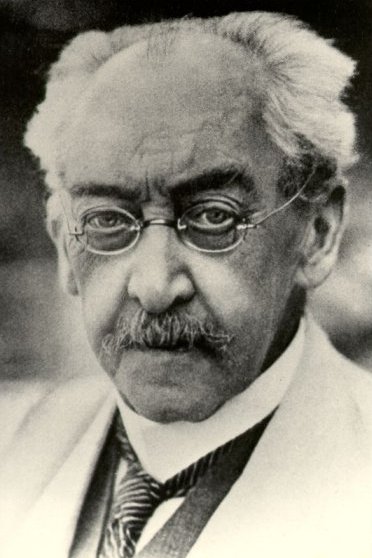 Von Harnack was a liberal theologian who believed in
Von Harnack was a liberal theologian who believed in
evolution and questioned the authority of Scripture
Constancy vs. Changeability in Matters Moral
So this is the question you must ask yourself: was the Master doing something completely new as far as human morality was concerned in the general sense, overturning the ritual purity and separation mitzvot (commandments) of the Law of Moses, or was He, in fact, bringing the Torah back into fuller alignment with the original intent? And here you have to be extra careful because the bottom line is the true nature of Elohim's (God's) heart. A reason I reject the first position is I do not believe Yahweh started with 'tougher' laws and then got 'softer' - that's where liberalism gets its impetus and justification - but that what we see in Yah'shua (Jesus) is the true heart of Yahweh as it always was, is, and ever shall be. Elohim (God) does not chop and change - He is the same yesterday, today and forever. It is man who has that particular weakness called 'moral changeability' that stems from the 'Old Creation' sin-nature.
It's All About Yah'shua Being Messiah
The liberal view - that Yah'shua (Jesus) is simply the purveyor of brand new moral principles, however sublime, in any case entirely misses Mark's point. For Mark (and indirectly, therefore, for Peter), Yah'shua's (Jesus') exceptional conduct at this point rests not on some new general principle but on His unique status the Messiah. Everything in the Story line revolves around that. At a very basic level, we can argue, justifiably, that a Divine Figure who had the obviously demonstrable power to remit sin need not fear the contagion of human sinfulness. We may have that problem, as I argued earlier, but He did not even though, as we shall learn later from the writer of Hebrews, who had worked out the theology, He "was in all points tempted as we are, yet without sin" (Heb.4:15, NKJV). If Yah'shua's (Jesus') talmidim (disciples) are justified in following His example in this matter - and remember that at the time of writing this question was still unanswered even if it's a 'given' for us, here, today - that is simply because they live in the new situation He has introduced and partake of His messianic power.
A Foretaste of the Resurrection Power
Indeed, they got a foretaste of this resurrection power-to-be - this New Creation Life-to-be (which came after the Cross and the anointing of the First Messianic Shavu'ot (Weeks, 'Pentecost') - when the 70 were sent out to heal and cast demons out. And if, as Isho'dad suggests, Mark had been a part of that body of 70 specially selected talmidim (disciples), which was both a trial run, as it were, of what was to come, along with his Dad, Peter (and training for post-resurrection apostles) then both would have been perfectly placed to understand and recognise the Baptism of the Ruach (Spirit) when it finally came after Yah'shua (Jesus) left, because they had had prior experience of it as members of the 70! Does that make sense? And it was this that the Torah-teachers (scribes) and P'rushim (Pharisees) failed to see - and once again their basic error, in Mark's eyes, was their failure to recongise the true - messianic - identity of Him with whom they were dealing.
Of Doctors and Righteous People
And herein lies a prophetic reason Yah'shua (Jesus) is doing so much healing - as a supernatural physican or doctor when in reply to the religious leaders' question, He answers them obliquely, saying:
"Those who are well have no need of a physician (doctor), but those who are sick. I did not come to call the righteous, but sinners, to repentance" (Mk.2:17, NKJV).
The 'Scribes-Pharisees'
Now we must do some theological detective work to wrap things up. I want to point out a deficiency in the New King James Version which reads "scribes [and] Pharisees" in verse 16 (NKJV) which N.T.Wright renders "legal experts [and] Pharisees" (KNT). Please be aware that the word "and" is not in the Greek text. It has been added for clarity. The original simply says, oddly, "scribes pharisees".
A Strange Designation
Now you would have thought that "and" was the obvious and most logical word to insert. It's not as though the word doesn't exist in either Greek or Aramaic. And yet numerous ancient authorities render this the way the more recent New Revised Standard Version (NRSV) and English Standard Version (ESV) do, namely, "scribes of the Pharisees" (NRSV, ESV) [8]. Why would they do that given a choice of the more 'obvious' "and"? In my opinion, it can only be because that was what the original said, otherwise why not just translate the original Aramaic as "and"? What does "scribes of the Pharisees" even mean? This is where it gets interesting!
Scribes Who Followed the Pharisees
By the way, this is the only passage which uses this curious word combination. What it literally means is "scribes belonging to the pharisee party (sect)". What's interesting is that it describes with remarkable accuracy the circumstances of Judaism in the days of Yah'shua (Jesus). According to the Yehudi (Judahite) historian Josephus, the P'rushim (Pharisees) were in process of transition to the ugly form we know so well and condemn so roundly (and which unfortunately infects what I call the 'ultra', harsh, intolerant wing of messianism). What was that position? It was a harsh, extremist line, that reflected an eagerness to subjugate the whole of life to every single detail of both the written and (so-called) 'oral' Torah.
Inter-Pharisee Sectarianism
Now the Torah-teachers or scribes, who were the professional teachers of the Law associated with the Pharisees (their name means 'separatists' [9]), were in the process of dividing into dissident groups, the more liberal supporting the more broadly tolerant, easy-going Pharisee position of Hillel (whose grandson was the wise Gamaliel - Ac.5:34ff.), with the more extreme adopting the more rigid orthodoxy taught by the School of Shammai, particularly in their attitide toward the outcast. What we are actually witnessing here in the Gospel of Mark is the staggering contrast between hard legalism that writes certain people off as 'outsiders' (to the true religious circle and so to Yahweh as well), and the forgiving grace of Elohim (God) that in Yah'shua (Jesus) reaches out to all men and women, even the most unlikely, without imposing any prior conditions or requirements. Hillel's talmidim (disciples) were much closer in outlook to Yah'shua (Jesus) and His talmidim (disciples), many of whom later converted. It was the Shammai School that so quickly decided that murdering Yah'shua (Jesus) was the only solution to their view prevailing. Gamaliel urged moderation and believed that if Christianity were false it would simple die a natural death like all other messianic movements before it.
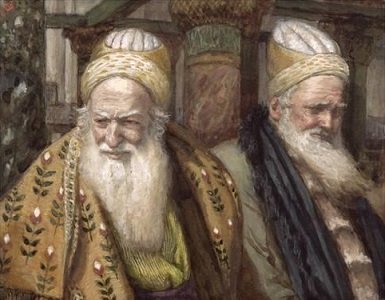 The two great Yehudi scholars of the 1st century BC, Shammai & Hillel
The two great Yehudi scholars of the 1st century BC, Shammai & Hillel
Healing and Forgiveness Without Being Defiled
This extremist, legalistic, very 'religious' "scribes of the pharisees" cult (the Shammai Cult), that so obsessed with ritual purity, is one of three groups mentioned in our text. The second, is the 'tax collectors and sinners', and the third, is Yah'shua's (Jesus) group - our group - which is concerned with the pursuit of personal purity and the fellowship of chesed (mercy). In the same way that Yah'shua (Jesus) cleansed the leper rather than being made ritually unclean by the leper, so Yah'shua (Jesus) brings sinners to repentance and forgiveness rather then being defiled by association with sinners. That's the message here and it's what the message of New Creation Life will be later. We're getting a preview of what Christian/Messianic life is supposed to be like, what it actually consists of. And it's nothing like the teaching and practice of the "scribes of the Pharisees".
A Potentially Confusing Remark
There remains but one last question we need to answer - and then we are finished for this week - and that concerns the potentially very confusing remarks made by the Master:
"Those who are well have no need of a physician, but those who are sick. I did not come to call the righteous, but sinners, to repentance" (Mk.2:19, NKJV).
Identifying the 'Well' and 'Righteous'
Who are the "well" and therefore "righteous" people who do not need Yah'shua (Jesus)? Is He using the word "righteous" ironically, meaning the 'self-righteous'? Are these the Scribes and Pharisees who had allowed the Gospel to pass them by because they felt that religiously they had arrived already? Or were the words 'well'/'sick' and 'rightous'/'sinners' simply intended to be used as a contrast? Is it possible these words were not meant to be pressed further? Such are the views of different scholars.
Self-Righteousness
Readers tend to get very confused over words like 'righteous' which they mix up with 'justification' which is our status or standing in Messiah, a later Pauline concept. We have to know what "righteous" means in Mark 2:17 and not, for example, Romans 3:10 where Paul says that "there is none righteous, no, not one" (NKJV). Here, in Mark, Yah'shua (Jesus) is simply saying that His opponents must judge for themselves whether they are "righteous" or "sinners". On account of their lack of mercy, though, they are, in fact, "sick" and "sinners" [10], rather like the qodeshim (saints, set-apart) ones in Laodicea, mentioned in the Book of Revelation, who thought they were rich needed of nothing when in fact they were "wretched, miserable, poor, blind, and naked" (Rev.3:17, NKJV). The "scribes of the Phariesses" were living in a similar delusion.
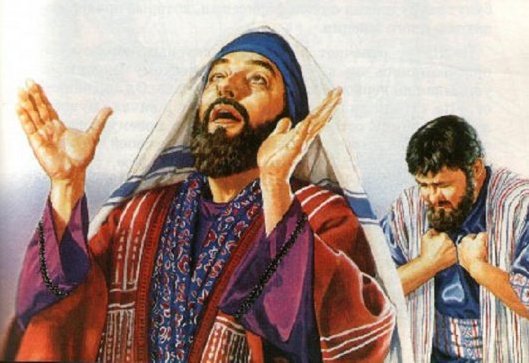 The Pharisee who thought he was righteous through legalistic observance of the Torah and the confessing sinner who knew he was not but appealed directly to Yah'shua and was justified - made righteous by faith
The Pharisee who thought he was righteous through legalistic observance of the Torah and the confessing sinner who knew he was not but appealed directly to Yah'shua and was justified - made righteous by faith
A Threat to the Whole Pharisee Way of Life
Yah'shua's (Jesus') offer of salvation threatens the Pharisees' whole way of life, yet it is at the heart of the Besorah (Gospel) He came announcing. Indeed, Matthew notes that He quoted Hosea in this incident (Mt.9:13) which Mark omits:
"I desire chesed (mercy = steadfast love), and not sacrifice (religious rituals)" (Hos.6:6, ESV).
Conclusion
We, in our turn, must view the people in the world - the 'tax collectors' and 'sinners' - in the same way that Yah'shua (Jesus) did. There are many messianics in particular - but not just them - who observe the Torah or the commandments in the wrong way, doing so in order to justify themselves instead of allowing Yah'shua (Jesus) to be our justification. And with that we shall end today. Until next week, may Yahweh bless you all! Amen.
Continued in Part 10
Endnotes
[1] I am personally a little sceptical as Luke, it is usually assumed, was a Gentile, and unless he was also a convert to Judaism first, it is unlikely he would have been received by Yehudi (Judahites) during the early Palestinian phase of the ministry.
[2] The claim is also made that Rhoda was Peter's biological daughter (again, unprovable), one of the reasons, some say, Peter went straight to the house immediately after his miraculous escape from prison at which Rhoda was a servant (Acts 12:13)
[3] This old English word is based on the Latin Vulgate's use of the word publicani (publicans), a senior official, whereas toll-collectors like Levi were merely the 'small fry' of the bureaucracy
[4] But see the many articles on free agency
[5] Tom Wright, Mark for Everyone (SPCK, London: 2001), p.21
[6] See B'rit Melah - the Covenant of Salt
[7] Lucian, Nekyom II
[8] I know of no current messianic translation that has spotted this discrepancy
[9] Literally, 'those who are separated from defilement and irreligion'. The Pharisees came into existence as a distinct body or group around 120 BC and were the successors of the hassidim who in the 2nd century BC resisted attempts on the part of many Yehudim (Judahites) to come to terms with pagan culture. They were not specifically a priestly caste though they banded together as fraternities with a view to keeping the Torah more perfectly and promoting their interpretation of the Tanakh (Old Testament) which included their oral traditions. Many of them were men of the highest principles and integrity and frequently champtioned the cause of ordinary people and those in need of protection against oppression (Josephus, Antiquities, XIII,10,6; XVIII,1,3)
[10] See Mark 2:23-27; 5:1-5; 7:1-15
Acknowledgements
[1] Tom Wright, Mark for Everyone (SPCK, London: 2001)
[2] D.E.Nineham, The Gospel of St.Mark; The Pelican New Testament Commentaries (Penguin Books, Harmandsworth, Middlesex, England: 1972)
[3] J.C.Fenton, The Gospel According to John in the Revised Standard Version (OUP: 1979)
[4] J.R.Dummelow, The One Volume Bible Commentary (Macmillan, NY: 1975)
[5] Thomas M.Mumford, Horizontal Harmony of the Four Gospels in Parallel Columns (Deseret, SLC, Utah: 1982)
[6] Hugh Anderson, The New Century Bible Commentary: The Gospel of Mark (Eerdmans, Grand Rapids, Michigan: 1981)
[7] Ed. Gerhard Kittel, Theological Dictionary of the New Testament - 10 vols. (Eerdmans, Grand Rapids, Michigan: 1976)
[8] N.T.Wright, The New Testament and the People of God: Christian Origins and the Question of God (SPCK, London: 2013)
[9] N.T.Wright, How God Became King: The Forgotten Story of the Gospels (Harper One, NY: 2012)
[10] N.T.Wright, Jesus and the Victory of God (SPCK, London: 1996)
[11] N.T.Wright, The Resurrection of the Son of God (SPCK, London: 2003)
[12] N.T.Wright, The Challenge of Jesus: Rediscovering Who Jesus was and Is (IVP Academic, Downers Grove, Illinois: 1999)
[13] Rev.Prof.F.Davidson (ed.), The New Bible Commentary (Inter-Varsity press, London: 1953)
[14] Ed. Margaret Dunlop Gibson, The Commentaries of Isho'dad of Merv, Bishop of Hadatha (c.850 AD) in Syriac and English, Vol. 1 (Cambridge University Press: 1911)

 V144
V144
|


